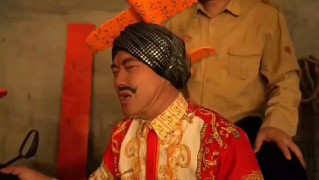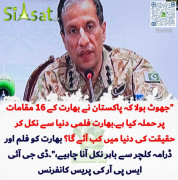canadian
Chief Minister (5k+ posts)
By:Raveena Aulakh
Canadians love Canada despite the dreadful winter, high taxes and loser Leafs.
So when it was reported earlier this week that immigrants are flunking the new, tougher citizenship test in record numbers, outraged Canadians took over news websites, flooded radio shows and even blogged about it.
Send them home, said one. Make it harder . . . no free rides, said another reader. There is just no excuse to fail the test, was another comment.
Because Canadians know everything about Canada, eh?
Think again.
On a rain-soaked morning this week, the Toronto Star conducted this admittedly unscientific experiment asking six Canadian-born to take the citizenship test. Three men and three women had 20 multiple-choice questions samples from Citizenship and Immigration Canadas website and 15 minutes. To pass, they needed 15 right answers.
The exercise yielded surprising results: three flunked, one squeaked by and two passed with flying colours.
Obviously a small sample but its a very interesting experiment, said Myer Siemiatycki, a professor in immigration settlement studies at Ryerson University.
You would expect Canadian-born to do better because it is in their language and they have lived here all their lives, he said. But this sample tells that Canadians have a job ahead of them for understanding their own country.
The new test, introduced March 15, is based on a bulked-up guide released a year ago to give newcomers a richer picture of Canadas history, culture and politics. It was introduced partially because critics said the old test was too straightforward and there were allegations that people were simply memorizing answers.
Discover Canada, a 63-page guide, replaced the slimmer volume from 1995 that had less information. The failure rate for the old citizenship test ranged between 4 and 8 per cent. But the rate rocketed to about 30 per cent when the new one was introduced.
Officials then revised the rules and made it a little easier, and now the failure rate stands at 20 per cent still way higher than a year ago.
The old and new tests are in English and French, and include 20 multiple-choice questions and a 30-minute time limit. But while wannabe-Canadians needed to get 12 questions correct in the old exam, the pass mark for the new test was set at 15.
In the Stars experiment, one woman got 15 questions right, while two men each got 18 correct.
No one got 20 out of 20.
To be fair, the six Canadians had no advance notice, no time to prepare and only 15 minutes to complete the test.
About 10 Star journalists also took the test and on average got 18 questions correct.
Surprisingly, the one question that tripped up almost everyone was on who can vote in federal elections. (Note to everyone: Only Canadian citizens can vote in any election. Not permanent residents, foreign workers, diplomats or international students.)
Matthew Consky, a 35-year-old insurance lawyer and self-confessed trivia buff, did the test in less than eight minutes. It wasnt very hard, though there are some trick questions, he admitted.
He isnt outraged that some immigrants are flunking it. Its good to know about Canadas history, but honestly Id be more concerned with language issues.
Peter Hall, an assistant retail manager in downtown Toronto, also took about eight minutes to complete the test and got 18 questions right. I think a lot of Canadians would also fail this test . . . I dont know why people are making such a big deal out of it for immigrants.
Not everyone feels that way.
Ildiko Drabik, who works for Initiative Media, an advertising agency, said she was disappointed new immigrants couldnt pass the test. Its not so hard, she said after getting 15 questions right in less than 10 minutes.
A first-generation Canadian whose parents emigrated from Hungary and Spain in the 1950s, she said newcomers should feel proud to be Canadian and part of that includes knowing the basic history of your adopted country.
I know most of this stuff . . . reminds me of Grade 10, said Chloe Tse, a 25-year-old freelance writer as she struggled to complete the test on a recent early morning.
She, like everyone else who tested their knowledge of Canada, was stumped when she got to the 13th question: Who was Sir Louis-Hippolyte La Fontaine?
No one had heard of the first person to head a responsible government in Canada, in 1849, although some examinees made a good guess.
That was a tough one, said Tse.
Julie LaFortune, a spokesperson for Citizenship and Immigration Canada, said the test comes from a pool of more than 100 questions. Questions are shuffled regularly and several different tests are used at each testing session to reduce any risk of memorization, she added.
Those who fail can show they meet the knowledge requirement, either by writing another citizenship test or through an interview with a citizenship judge. The judge rules whether the applicant meets all the requirements for citizenship, including adequate knowledge of English or French.
Applicants can reapply.
About 150,000 people take the citizenship test every year. The required 75 per cent to pass is the same as in Australia and the United Kingdom, but higher than the 60 per cent required south of the border. (www.star.com)
Canadians love Canada despite the dreadful winter, high taxes and loser Leafs.
So when it was reported earlier this week that immigrants are flunking the new, tougher citizenship test in record numbers, outraged Canadians took over news websites, flooded radio shows and even blogged about it.
Send them home, said one. Make it harder . . . no free rides, said another reader. There is just no excuse to fail the test, was another comment.
Because Canadians know everything about Canada, eh?
Think again.
On a rain-soaked morning this week, the Toronto Star conducted this admittedly unscientific experiment asking six Canadian-born to take the citizenship test. Three men and three women had 20 multiple-choice questions samples from Citizenship and Immigration Canadas website and 15 minutes. To pass, they needed 15 right answers.
The exercise yielded surprising results: three flunked, one squeaked by and two passed with flying colours.
Obviously a small sample but its a very interesting experiment, said Myer Siemiatycki, a professor in immigration settlement studies at Ryerson University.
You would expect Canadian-born to do better because it is in their language and they have lived here all their lives, he said. But this sample tells that Canadians have a job ahead of them for understanding their own country.
The new test, introduced March 15, is based on a bulked-up guide released a year ago to give newcomers a richer picture of Canadas history, culture and politics. It was introduced partially because critics said the old test was too straightforward and there were allegations that people were simply memorizing answers.
Discover Canada, a 63-page guide, replaced the slimmer volume from 1995 that had less information. The failure rate for the old citizenship test ranged between 4 and 8 per cent. But the rate rocketed to about 30 per cent when the new one was introduced.
Officials then revised the rules and made it a little easier, and now the failure rate stands at 20 per cent still way higher than a year ago.
The old and new tests are in English and French, and include 20 multiple-choice questions and a 30-minute time limit. But while wannabe-Canadians needed to get 12 questions correct in the old exam, the pass mark for the new test was set at 15.
In the Stars experiment, one woman got 15 questions right, while two men each got 18 correct.
No one got 20 out of 20.
To be fair, the six Canadians had no advance notice, no time to prepare and only 15 minutes to complete the test.
About 10 Star journalists also took the test and on average got 18 questions correct.
Surprisingly, the one question that tripped up almost everyone was on who can vote in federal elections. (Note to everyone: Only Canadian citizens can vote in any election. Not permanent residents, foreign workers, diplomats or international students.)
Matthew Consky, a 35-year-old insurance lawyer and self-confessed trivia buff, did the test in less than eight minutes. It wasnt very hard, though there are some trick questions, he admitted.
He isnt outraged that some immigrants are flunking it. Its good to know about Canadas history, but honestly Id be more concerned with language issues.
Peter Hall, an assistant retail manager in downtown Toronto, also took about eight minutes to complete the test and got 18 questions right. I think a lot of Canadians would also fail this test . . . I dont know why people are making such a big deal out of it for immigrants.
Not everyone feels that way.
Ildiko Drabik, who works for Initiative Media, an advertising agency, said she was disappointed new immigrants couldnt pass the test. Its not so hard, she said after getting 15 questions right in less than 10 minutes.
A first-generation Canadian whose parents emigrated from Hungary and Spain in the 1950s, she said newcomers should feel proud to be Canadian and part of that includes knowing the basic history of your adopted country.
I know most of this stuff . . . reminds me of Grade 10, said Chloe Tse, a 25-year-old freelance writer as she struggled to complete the test on a recent early morning.
She, like everyone else who tested their knowledge of Canada, was stumped when she got to the 13th question: Who was Sir Louis-Hippolyte La Fontaine?
No one had heard of the first person to head a responsible government in Canada, in 1849, although some examinees made a good guess.
That was a tough one, said Tse.
Julie LaFortune, a spokesperson for Citizenship and Immigration Canada, said the test comes from a pool of more than 100 questions. Questions are shuffled regularly and several different tests are used at each testing session to reduce any risk of memorization, she added.
Those who fail can show they meet the knowledge requirement, either by writing another citizenship test or through an interview with a citizenship judge. The judge rules whether the applicant meets all the requirements for citizenship, including adequate knowledge of English or French.
Applicants can reapply.
About 150,000 people take the citizenship test every year. The required 75 per cent to pass is the same as in Australia and the United Kingdom, but higher than the 60 per cent required south of the border. (www.star.com)






























